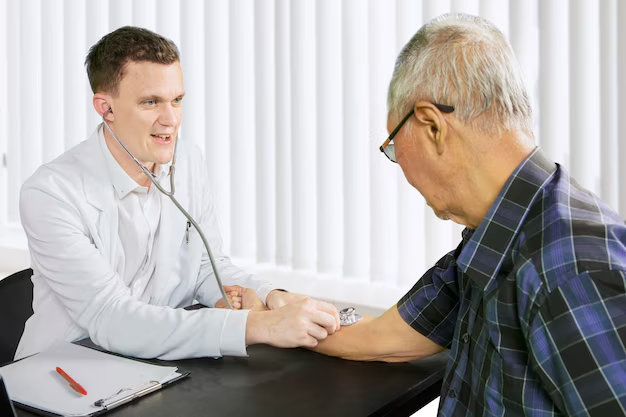Your Guide to How To Diagnose Parkinson
What You Get:
Free Guide
Free, helpful information about Parkinsons FAQ and related How To Diagnose Parkinson topics.
Helpful Information
Get clear and easy-to-understand details about How To Diagnose Parkinson topics and resources.
Personalized Offers
Answer a few optional questions to receive offers or information related to Parkinsons FAQ. The survey is optional and not required to access your free guide.
Understanding Parkinson's Diagnosis: What You Need to Know
Detecting Parkinson's disease involves navigating a complex array of symptoms and tests, which can be daunting for anyone facing this medical condition. While there is no definitive test for Parkinson's, understanding the diagnostic process can empower individuals and families with crucial insights and direction.
What is Parkinson’s Disease?
Parkinson’s is a progressive neurological disorder primarily affecting movement. The hallmark symptoms include tremors, which are involuntary shakes, stiffness, slowness of movement, and balance difficulties. Recognizing these signs is the first step in investigating the presence of Parkinson’s.
Initial Steps in Diagnosis
Once these symptoms are apparent, it’s vital to consult a neurologist, a specialist in nervous system disorders. A thorough medical history review and a neurological examination are typically the starting points. During these exams, doctors will look for two or more of the cardinal symptoms mentioned: tremor, bradykinesia (slowness of movement), and muscle rigidity.
Advanced Diagnostic Tools
Though no definitive laboratory tests exist for Parkinson's, certain practices aid in ruling out other conditions. Imaging tests, such as MRI or CT scans, might be employed to exclude other disorders that may cause similar symptoms. Additionally, more specialized scans like dopamine transporter (DAT) scans can provide imagery that supports the diagnosis by highlighting reduced dopamine activity in the brain, characteristic of Parkinson's.
Response to Medication Test
Often, one of the telling methods to diagnose Parkinson’s is observing how the symptoms respond to dopaminergic medications, most commonly levodopa. Significant improvement upon administration of these drugs often indicates the presence of Parkinson’s.
Early Diagnosis and Management
Early diagnosis is crucial as it paves the way for better symptom management and can greatly improve quality of life. Recognizing potential signs early and seeking professional evaluation can lead to timely interventions.
Beyond Diagnosis: Navigating Life with Parkinson’s
Once diagnosed, numerous support opportunities can help manage the disease's financial and lifestyle implications:
- Government Aid Programs: Look into Social Security Disability Insurance (SSDI) and Supplemental Security Income (SSI) for financial assistance if your ability to work is impacted.
- Healthcare Benefits: Medicare and Medicaid can provide necessary coverage for medications and regular medical care.
- Debt Relief Options: Explore debt management plans to help handle medical debt without facing significant financial stress.
- Insurance Solutions: Long-term care insurance might be beneficial to cover future healthcare costs related to advanced Parkinson’s.
- Nonprofit Support: Organizations like the Parkinson’s Foundation offer resources, community support, and educational materials.
Transitioning from simply understanding the diagnosis to effectively managing life with the disease involves both medical and lifestyle adaptations. Addressing financial and health coverage needs proactively can alleviate some of the burdens associated with Parkinson’s disease, allowing individuals and families to focus more on well-being and less on worry.
Let’s look at some helpful programs and support options that may assist:
🏥 Medical Financial Aid Programs
- Medicare: Federal program providing health coverage if you're 65 or over.
- Medicaid: State and Federal program offering aid based on income.
💸 Debt Assistance Resources
- National Foundation for Credit Counseling: Offers free credit counseling and financial management advice.
- Debt Management Plans: Arrangement to reduce interest rates and fees on existing debts.
📚 Educational and Support Grants
- Parkinson’s Foundation Grants: Provides funding for community outreach education and support.
Make sure to explore these avenues to make living with Parkinson’s more manageable and to stay informed about additional resources that can offer support.
What You Get:
Free Parkinsons FAQ Guide
Free, helpful information about How To Diagnose Parkinson and related resources.

Helpful Information
Get clear, easy-to-understand details about How To Diagnose Parkinson topics.

Optional Personalized Offers
Answer a few optional questions to see offers or information related to Parkinsons FAQ. Participation is not required to get your free guide.


Discover More
- Are There Environmental Causes Of Parkinsons
- Can Alcohol Cause Parkinson's
- Can Concussions Cause Parkinson's
- Can Concussions Cause Parkinson's Disease
- Can Dogs Get Parkinson's Disease
- Can Dogs Get Parkinsons
- Can Dogs Have Parkinson's
- Can Dogs Have Parkinson's Disease
- Can Females Get Parkinson Disease
- Can Head Trauma Cause Parkinson's
